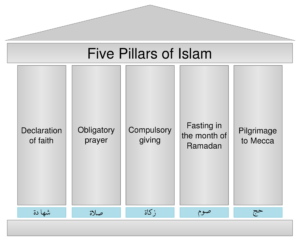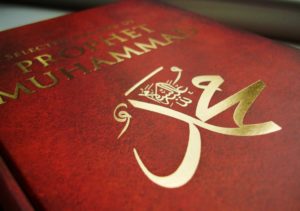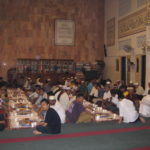Standing as one of the most influential and fastest-growing belief systems of our time is the religion of Islam. Islam was birthed from the teachings and life of the Prophet Muhammad. The five central pillars of the faith, the role, and importance of the Prophet Muhammad, the teachings of the Quran are all central and essential elements that makeup Islam. Three major schools of thought that being the Sunni, Shi’a and Sufi denominations, emphasize and practice the essential elements of the religion, and all are contained within the circle of the Islamic religion.
The five central pillars
The most prevalent beliefs that are practiced by Muslims are the five central pillars. Of these five pillars, Shahada, or the profession of faith, is the most important. Shahada is a declaration of faith that is stated by a Muslim. Also acting as a creed, it contains the central tenets of Islam. First, there is only one God, Allah, which should be feared and worshipped. Furthermore, Allah has no equal or progeny. The other declaration is that Muhammad is a prophet of God. The Prophet is believed to be the last of the prophets sent to deliver the message of God, and he serves as the “seal” of the prophets.
 The next most important pillar of Islam is Salat or prayer. Salat is to be performed 5 times a day. Prayers are to be performed before dawn, mid-day, late-afternoon, sunset, and nightfall. Salat allows for a direct connection between a Muslim and God, in which a believer may supplicate and ask for glad-tidings and forgiveness. Salat’s importance comes from the fact that within prayer, a believer has a chance to become closer to God.
The next most important pillar of Islam is Salat or prayer. Salat is to be performed 5 times a day. Prayers are to be performed before dawn, mid-day, late-afternoon, sunset, and nightfall. Salat allows for a direct connection between a Muslim and God, in which a believer may supplicate and ask for glad-tidings and forgiveness. Salat’s importance comes from the fact that within prayer, a believer has a chance to become closer to God.
Zakat, or charity, is another pillar of Islam. Zakat mandates that every Muslim should aid his community by offering charity to those in need. By giving Zakat, a Muslim not only aids those less fortunate, but he betters himself through gaining purification and good deeds. Zakat is not at all necessary if a believer lacks the funds.
Another pillar of Islam is to fast during the month of Ramadan. A Muslim would perform fasting by abstaining from food, beverages, sexual relations and avoidance of anything that may lead to or cause a believer to sin. Fasting is performed every day from sunrise to sunset for the entire month of Ramadan. Fasting is seen as a form of spiritual purification. By cutting off ties from food and drink, a Muslim is able to experience the hardships of those who are less fortunate. It also allows Muslims to build their self-restraint. If an individual is not capable of fasting due to reasons of sickness, youth or any other inability, the individual can delay their fasting to another day or perform another deed to replace fasting.
Hajj, or the pilgrimage to the holy city of Mecca, is possibly the most self-affirming experience of a Muslim, and it is also the final pillar of Islam. Muslims are prescribed to perform Hajj at least once in their lifetime if monetary and physical health allows it. Before beginning the pilgrimage, the Muslim believer must affirm their intentions and perform certain rites while performing Hajj. Male Muslims must don simple white tunic-like clothing in order to affirm the belief that all men are equal regardless of worldly status. Originating from the history of Abrahamic times, the rites of Hajj include circling the Ka’ bah seven times. Muslims must also go back and forth between the hills of Safa and Marwa, which emulates Hagar attempting to find water for her son, Ishmael. Muslims then travel to the mountain of Arafat where they pray and supplicate to God. Muslims will then sojourn to Muzdalifah where they will gather pebbles to use in a ritual of the stoning of the Devil the following day. Hajj is ending in the day of celebration known as Eid. Eid is when Muslims celebrate their trails throughout Hajj. They will also perform ritual animal sacrifice that will then be passed out to the needy.
The Sacred literature of the Quran
Alongside the five pillars of Islam is the sacred literature of the Quran. The sacred literature contained within the Quran was revealed to the Prophet Muhammad. Muslims believe that it is the direct word of God that was delivered to the Prophet Muhammad by the angel Gabriel. The Quran contains instructions, commands and allegories that inform the Muslim believers of the doctrines of Islam. Inside, the literature affirms all the teachings of the previous prophets that are can be found in Jewish and Christian literature. It also restates and bolsters the five pillars of Islam.
 Prophet Muhammad is seen by Muslims as the last and final messenger of God. His life and teachings are of utmost importance within the Islamic faith. The Prophet Muhammad is referred to as the “seal” of the prophets due to the belief that he is the last messenger sent by God. The Prophet Muhammad is believed to have received several revelations from God over the course of 23 years. From those revelations, the Quran was created and put together to serve as a guide for Muslim believers. Not only is the Prophet Muhammad attributed with the formulation of the holy Quran, but the actions of his everyday life also serves as examples of how a pious Muslim should live his life in the best way imaginable. The Prophet Muhammad’s pious actions are known as Sunna. Put together after the death of the Prophet Muhammad, Hadith literature is the written experiences of the disciples that lived alongside the Prophet Muhammad as well as the sunna. Hadith serves as descriptive, in-depth accounts and instructions that add more details regarding certain aspects of daily life. Hadith was used to build Islamic law, known as shari’ a, which further magnifies the importance of the Prophet.
Prophet Muhammad is seen by Muslims as the last and final messenger of God. His life and teachings are of utmost importance within the Islamic faith. The Prophet Muhammad is referred to as the “seal” of the prophets due to the belief that he is the last messenger sent by God. The Prophet Muhammad is believed to have received several revelations from God over the course of 23 years. From those revelations, the Quran was created and put together to serve as a guide for Muslim believers. Not only is the Prophet Muhammad attributed with the formulation of the holy Quran, but the actions of his everyday life also serves as examples of how a pious Muslim should live his life in the best way imaginable. The Prophet Muhammad’s pious actions are known as Sunna. Put together after the death of the Prophet Muhammad, Hadith literature is the written experiences of the disciples that lived alongside the Prophet Muhammad as well as the sunna. Hadith serves as descriptive, in-depth accounts and instructions that add more details regarding certain aspects of daily life. Hadith was used to build Islamic law, known as shari’ a, which further magnifies the importance of the Prophet.
The Schism
All three of the Islamic denominations follow the basic principles, including the five pillars and the Quran. The main religious schism came from a disagreement regarding the political and religious leadership after Prophet Muhammad’s death. This schism led to the formation of the Sunni and Shi’ denominations. Essentially, the Sunni and Shi’ denominations believe in the same thing. Sunnis stand firm on the belief that the first four Caliphs that succeeded Prophet Muhammad were indeed righteous successors. The Caliphs earned their authority to reign from their piety. Sunnis place great emphasis on Hadith and the Sunna because it is a guide to living life in the most pious way and was used to create the holy laws found in Shari’ a. Any innovation or deviation from the original system of religion is strictly forbidden and is seen as heretical. Another defining feature of the Sunni denomination is the belief that the messianic figure, known as a Mahdi, is the Prophet Jesus who would reappear at the end of time to restore order and religion to the world.
Shi’ as
Shi’ as, on the other hand, say that actual authority is held by the family of the Prophet. They place greater authority in the family of Prophet Muhammad over the elected Caliphs that succeeded. Following in importance to that of the family of the Prophet are the traditions, known as Akhbar, and communication of the religious community. Ranked third in spiritual importance is the ulama or educated, pious individuals who provide interpretations and explanations to religious literature. The Shi’ a denomination also has formed a type of occultation of the twelfth Imam who disappeared. Shi’ as believe that the messianic figure who would return at the end of time would, in fact, be the twelfth Iman and not the Prophet Jesus.
The Sufism
The final denomination of Islam is Sufism. Sufism was not birthed from political disagreement. Rather, Sufism places greater emphasis on the spiritual and mystical interpretation of Islam. Sufism not only respects and practices the basic tenets of Islam; it goes further by concentrating on the spiritual union between a Muslim and God. Under the guidance of a Sufi spiritual leader, known as a shaykh, individuals practice spiritual rituals that rid themselves of the physical world in order to unite with God. Sufism takes a moderate stand in regards to the political schism between the Sunnis and Shi’ as. Their main concern is becoming closer to God.
Originating from the teachings and revelations Prophet Muhammad, Islam has spread throughout the world and continues to do so. All Muslims respect and practice the essential doctrines found in the five main pillars of Islam, the Quran, and the Hadith literature in order to become more pious individuals for the sake of their religion. Unlike other Abrahamic religions, the main religious schism arose originally from political misunderstanding. Yet, each denomination holds firm to the original belief system created more than 1400 years ago.






